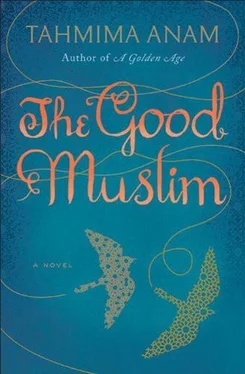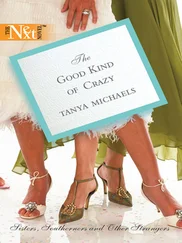‘Are you ill?’ Maya asked, wondering if, after all, she didn’t look a bit pale.
Ammoo turned to examine her, as if noticing her for the first time. ‘You need to comb your hair,’ she said.
‘Fine,’ she said, grabbing her brush from the dressing table. ‘You are the one who kept telling Sohail he should meet Bangabandhu.’
Ammoo was facing the mirror again, wiping away at her lipstick with a handkerchief. ‘You never told me what you were doing for the Women’s Rehabilitation Centre,’ she began.
‘As in?’ Maya knew what she was getting at; she was going to ask her about the operations. She didn’t want to talk about it; she didn’t even want to think about it. How had Ammoo known? The clinics were not at the centre itself, and, though they had not been explicitly ordered to keep their activities a secret, none of the doctors or nurses ever spoke about it.
‘You remember Piya?’
Maya nodded. Of course she remembered Piya. ‘She was pregnant.’
‘Yes, I knew.’
‘You knew?’ Ammoo paused for a moment, taking this in. ‘She wanted — she wanted to get rid of it. She was afraid of the operation, she wasn’t sure. She held my arm like this—’
Ammoo turned to Maya and gripped her elbow, her fingers hot, her lips smudged and red. ‘And she said, please, I don’t want to. And you know, a few days later, she was gone. She disappeared. Why do you think she left?’
‘Maybe she changed her mind.’
Ammoo tightened her grip on Maya’s arm, and they looked at each other. Maya didn’t want to tell her what had happened the night before Piya left. ‘Maybe it was better’, she said, ‘for everyone.’
‘Don’t you see?’ Ammoo’s voice was cracked, her eyes swimming. ‘They forced her. And she’s not the only one. Some of the girls don’t want to. But they’re ashamed, they’re told they’re carrying the seed of those soldiers.’
Bangabandhu had promised to take care of the women; he had even given them a name — Birangona, heroines — and asked their husbands and fathers to welcome them home, as they would their sons. But the children, he had said he didn’t want the children of war. Maya told herself this every day, every day while she put the mask over their faces and told them to count backwards from 100. ‘Isn’t it better, Ma, to erase all traces of what happened to them? That way they can start to forget.’
‘But their children, Maya, their children.’ Rehana passed the back of her hand over her eyes and turned away from her. Thick-throated, she said, ‘You’re not a mother, you won’t understand.’ She crumpled the letter and tossed it aside. ‘Let’s go, we’re going to be late.’
Maya was worried Ammoo would say something to Bangabandhu, about the war babies, but she needn’t have worried; Ammoo was quiet and polite and repeated what an honour it was to meet him. Only she could tell that Ammoo was trying to convince herself, that the thing did not sit right with her, and that, even as she allowed him to hold her hands between his, she resisted him, doubted his sincerity.
Maya offered no such resistance. Bangabandhu was the closest thing to a deity she had ever known, and to have him standing before her, touching her head as she bent down to take the dust of his feet, was almost too much. She thought she might vomit, and gulped down the bottle of Fanta brought in on a trolley by the servant.
He was surrounded by his family — she glimpsed his daughter, Hasina, and Sheikh Moni, his nephew. Mrs Mujib was there too, and although the room was empty when they first entered, it was soon crowded with people, touching Bangabandhu’s feet and crying with the sheer joy of it.
He lit his pipe and gave it a few short, shallow breaths.
Sohail sat transfixed, mirroring what Maya imagined was her own fascination.
‘You are responsible for the power-plant blast?’
‘Ji, sir,’ Sohail said, nodding.
‘Very audacious of you, my son.’
‘Risk was great, sir, but we were determined.’ Sohail’s head was bent, but she saw the curve of his mouth. He was smiling. She hadn’t seen him smile like that in months.
‘Shahbash,’ Bangabandhu said. ‘Come here, let’s take a photo. Come, come.’
Sohail had brought his Leica, but a photographer was already stationed, and they arranged themselves on either side of Bangabandhu. Maya put on the face she thought would be most appropriate for the photograph: a serious, determined young citizen, grateful to be in the presence of this man.
As they gathered around him for the photo, Bangabandhu turned to her and said, ‘And you, my dear, how did you pass those nine months?’
Maya looked at Ammoo, and she nodded. ‘I worked. I was in Theatre Road, sir. It was my honour to serve the government in exile.’
‘Theatre Road! Your mother let you go to Calcutta? Well, you are a brave girl.’
‘It was wonderful, sir, so many of us, working together.’
He regarded her quietly, gnawing on his pipe. ‘I would have liked to see that, ma. I would have liked that very much.’
Maya wondered if Bangabandhu had felt as she had — left out, stuck somewhere safe and unremarkable — when the fighting broke out and she couldn’t enlist in the army. He had been in prison the whole time. He hadn’t seen a day of fighting or listened to a single broadcast. She hoped he knew that he was there without being there, because they had gone to sleep every night with his name on their lips and woken every morning to his portrait, cut out of newspapers, on their walls, his voice on the radio. It didn’t matter to anyone that he had been in jail and not on the front lines of the battle. Though perhaps it mattered to him.
She wanted to tell him all of this, but a group of new visitors came to the door, and Bangabandhu’s attention was diverted. By now she really needed the toilet, but she told herself she should concentrate on this moment, because she was going to always remember it, and she tried to fix Bangabandhu’s face in her mind so she would be able to recall what he was wearing, and the weight of his hand on her head.
She looked across the room and saw Sohail sitting very straight with his knees in his hands. He rose to get up, but Bangabandhu was telling Ammoo about the other women like herself who had harboured freedom fighters in their homes, and asking if she had known any of them. Maya heard him asking what had happened to her husband, and when Ammoo told him, she saw Bangabandhu hold her two hands between his two hands again and tell her he was very sorry, and that she was very brave to raise her children without a father.
Finally, they gathered around the doorway.
‘There’s a lot of work to be done, my children,’ Bangabandhu said. ‘I hope I can trust you.’
‘Ji, sir.’ Sohail bent to touch his feet again, but Bangabandhu held him by the shoulders and lifted him up until they were eye to eye, then he embraced Sohail, three times, as though they were father and son. He walked them the entire way to the gate, and afterwards all they could talk about was how warm, how genial and how like any other person he had been.
Even Ammoo could not help but praise him, remarking on how, no matter how many people were in his presence, he fixed his eyes on you as if he were telling you a deep secret, as if you were conspiring with him on something, something lasting and great.
Maya was astonished by the number of people who came through the door. Mrs Rahman arrived first, fluffed up Rehana’s pillows and stuffed the fridge with chicken stew. She was followed by a group of women from the Ladies’ Club, all promising to postpone their annual Rummy tournament until Rehana returned. The fish-hawker came, and the butcher she had known for over twenty years, bearing an enormous mutton bone and promising the soup would cure whatever had made her ill. Flowers arrived from the principal of Maya’s junior school, and from the Dhanmondi Society. Sufia’s sister and her husband came, dressed in formal clothes and bearing a prayer written by their local pir on a tiny piece of paper. Even the German tenant came, clutching a spray of roses. He stayed only a minute, but long enough for Maya to appraise him and find him sorely disappointing. Bald, so tall he had to duck to get through the door and covered in a fine coating of orange hair, he smiled his way through the visit, then passed Rehana an envelope labelled SEPTEMBER 1984 RENT.
Читать дальше












